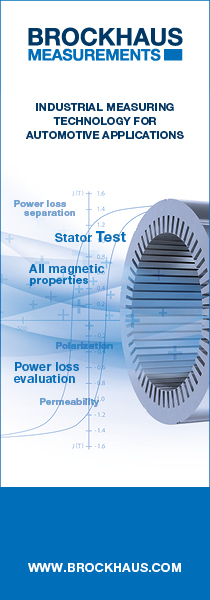Updated 04/04/17
Electrical machines are estimated to contribute to more than 99% of the global electricity generation and 65% of all utilisation of electrical energy. This means that even a minor increase in machine efficiency will not only have a dramatic economic but also ecologic impact on the society. The power losses, e.g. core losses, magnet eddy current losses, copper losses and mechanical losses, etc. are the key for improving machine efficiency.
This one-day seminar will gather the prominent researchers from both academia and industry in order to share their new findings and provide a unique insight into the latest developments in the area of machine losses prediction and measurement as well as the associated thermal management.
There will be plenty of opportunities for networking and at the end of the seminar the delegates will be invited to visit the laboratory facilities in the Power Electronics, Machines and Control Research (PEMC) group.
Please note the lab tour is about 20 minutes walk from the seminar venue. Unfortunately there is no parking closer to the labs.
NB
SPONSORS
Neodymium Level

Samarium Level

TRAVEL INFORMATION
Getting to the Jubilee Conference Centre
Jubilee Conference Centre,
Nottingham
NG7 2TU
0115 938 0080
PLEASE NOTE: Car parking is available for all delegates however all vehicles will need to display, in their window screen, a car parking card which will have to be obtained from reception on arrival. Failure to do so will result in a fine from the University which unfortunately is out of our control. Please ensure you pick up on your arrival.
Rail
The nearest stations to the Jubilee Conference Centre is Nottingham Train station, 2 miles away. There are over 30 direct trains that travel between St Pancras and Nottingham on a daily basis.
Road
Leave the M1 at Junction 25 taking the A52 to Nottingham. After five miles you will come to the A6514 (Middleton Boulevard) roundabout. Go straight across (this becomes Derby Road). On your right you will pass the Queen’s Medical Centre. About 1 mile past the roundabout turn left onto Triumph Road (Jaguar Garage is on the corner). The Jubilee Conference Centre is situated on the left after half a mile. Proceed through the security barrier, at the end of the road turn left; the Jubilee Conference Centre main entrance is situated on the right. Please note, there is limited car parking available on-site at the Jubilee Conference Centre.
Air
The Jubilee Conference Centre is located just 10 miles from East Midlands International Airport, leave the M1 North at Junction 25 and follow the A52. There is also the regular Skylink Nottingham bus, leaving directly from the airport directed to Broad Marsh Bus Station. The nearest stop to the Jubilee Conference Centre is Queens Medical Centre.
ACCOMODATION
A Rate of £65.00 bed & breakfast for a standard bedroom, per night has arranged with
Hilton Nottingham
Milton Street, Nottingham, NG1 3PZ, United Kingdom
tel: +44-115-934-9700
If you would like a room for this event, please email James the Events Manager at events@ukmagsoc.org and he will forward you the link.
The arrangement will be held until 25th March 2017, after that we cannot guarantee rooms will be available.
Please let James know if you wish to join us for dinner in the hotel on the Tuesday Evening.
Magnetic Losses and microstructure in Electrical Steels
by Prof Fernando Jose Gomes Landgraf of Instituto de Persquisas Technologicas, Brazil
Assuming that Magnetic Loss Separation still offers opportunities for a better understanding of the role of processing and microstructure of electrical steels to losses in machines, new relevant quantitative information about such relations will be presented.
The effect of chemical composition, grain size, second phases, dislocations and texture on hysteresis, classic parasitic and anomalous losses will be discussed, using the concepts of hysteresis loss subdivision and graphic representation of each loss component on the AC hysteresis curve to discuss possible energy dissipation mechanisms.
Please Note: Prof Landgraf will not be attending the seminar, but speaking using Skype.
You must be a member to download papers. Membership Information...
Hidden Losses in Electric Machines
by Prof Tim Miller of
In electric machines, high efficiency implies low losses. Designers are therefore concerned to understand the separate components of power loss in order to minimize them, and in recent times it has become possible to calculate certain of these components more accurately using sophisticated numerical analysis.
However, some of these “loss mechanisms” are not amenable to calculation at all. They may not even be definable in the precise terms of a posed mathematical problem, and this puts some of them beyond the range of even the most advanced numerical methods. The engineer is then thrown back on his or her proficiency in experiment, experience, and intuition — especially when tested efficiency falls short of the design prediction.
The higher the efficiency, the smaller the individual loss components will be. In the pursuit of high efficiency it becomes necessary to consider “loss mechanisms” in more detail, and to pay attention to some that might be swept under the carpet as “stray losses” beyond the scope of the designer’s calculating ability — and even beyond his or her understanding.
This discussion classifies the loss components into characteristic or principal losses, and parasitic or “non-characteristic” losses attributable to imperfections in manufacturing or design. A number of points are made concerning desirable practices at the design stage and at certain other stages including manufacturing, testing and operating the machine.
You must be a member to download papers. Membership Information...
You must be a member to download papers. Membership Information...
Rotor losses in PM Synchronous Machines
by Prof Suleiman Sharkh of University of Southampton
The talk will present recent work on the calculation of rotor losses in PM synchronous machines. Accurate calculation of these losses is critical as they tend to be very small compared to the other losses in the machine and a small error of a few tens of watts in the calculation of these losses may result in designing a machine that may fail or ruling out a feasible design. For example, in a commercial 60 kW, 60krpm generator a 25 W of loss is tolerable, but if the loss is say 50 – 100 W, then the rotor will overheat, which will lead to failure.
Alternative methods and design variations that may be used to reduce rotor losses will be also discussed.
The talk will conclude with a discussion of outstanding research questions that will be the subject of future research.
You must be a member to download papers. Membership Information...
You must be a member to download papers. Membership Information...
Power Loss and Thermal Analysis in Modern Design of Electrical Machines
by Dr Rafal Wrobel of University of Bristol
The modern design of electrical machines is governed by numerous frequently conflicting design requirements, such as high-power/torque-density, high-efficiency, low-cost and high-reliability among others. These factors, together with the continuous drive to accelerate the development process, have imposed significant challenges for machine designers. In this context, a 'Design for Application' approach is necessitated, where all 'non-ideal' and 'essential’ multi-disciplinary effects are accounted for in a comprehensive manner.
This presentation briefly introduces the ‘Design for Application’ methodology. Thereafter the focus moves to the multi-physics ‘Design for Performance’, a building block of the design paradigm. Here, a series of challenges associated with reliable predictions of the power loss and temperature in design of electrical machines are discussed. An experiment informed design methodology utilising various hardware sub-assemblies is presented next. This provides a mean to ‘fully’ inform the design process. Finally, a number of case studies are presented showcasing the proposed approach.
You must be a member to download papers. Membership Information...





